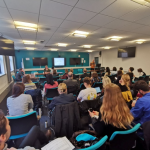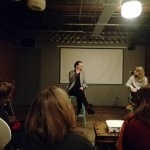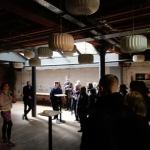New Russias
As a PhD researcher, it’s easy to focus solely on my own interests in Russian culture and neglect the bigger picture. That’s why heading to Manchester on the weekend of 7th-9th February for the New Russias Festival was so rewarding. Organised by PhD students from Leeds and Manchester Universities, the weekend began with a symposium studying Russian culture since 2010, of which more below. This was followed by a plethora of cultural events, including gigs from Motorama and Pompeya, readings and talks from writers Elena Chizhova, and Anatoly Kudryavitsky, and screenings and discussions with director Sergei Kachkin, not to mention an art walk following Russian artists’ impressions of Manchester, where, thankfully, it was still sunny.

The beginning of the art walk led by artist Alisa Oleva
Friday’s symposium offered panels on the music, cinema, arts, and literature (respectively) of contemporary Russia, with many areas of crossover and consensus. The music panel, with presentations from Alexei Semenenko, Caroline Ridler and Ilya Yablokov, explored how the music industry wields power, with artists joining forces with politicians for their mutual benefit (Тимати and his Black Star empire are a good example of this) but also joining in protesting against the status quo. They discussed rap as protest art, mentioning rap by Хаски, Дельфин and Oxxxymiron, as well as the endurance of Viktor Tsoi’s protest song Я Хочу Перемен. Tsoi’s cult of personality has been politicised and used by activists on both sides of the political divide. My favourite takeaway from the conference was Russian TV presenter Kiselyov’s insistence that rap was a Russian invention; he proceeded to rap Mayakovsky to prove his point. You can draw your own conclusions…

Sergei Kachkin talks to Adelaide McGinity-Peebles about his film On the Way Home
Jade McGlynn, Irina Schulzki, Åsne Høgetveit, and Natalija Majsova discussed their areas of research and expertise in the next panel on contemporary cinema. Here also we heard how developments in technology are making it easier for directors to produce their own films, leading to a move away from Moscow, with filmmakers such as Kantemir Balagov making films that celebrate victims and outsiders in a break from traditional cinema. This increasingly independent cinema appears to challenge Ministry of Culture-funded films, which tend towards a genre of ‘happy war films’ (as Jade McGlynn put it). 2018’s Танки is an excellent, if terribly scripted and historically inaccurate, example of the latter genre.

Vlad Strukov talks about contemporary art in Russia
Talk of non-Moscow-centric culture continued with Vlad Strukov’s paper about the art scene in the Caucasus, including the Ural Industrial Biennial of Contemporary Art, and its importance to the art scene in general, both inside Russia and beyond. Turning back to Moscow, Fabienne Rachmadiev talked about the recent Pavel Pepperstein exhibition in Гараж, and Margarita Kuleva spoke, among many things, of the tradition of тусовка in art establishments, describing the communal, and in many ways still Soviet, lifestyle of workers in establishments such as Гараж, Strelka and Winzavod.
The end of the day saw the panel on contemporary literature, with contributions from Sarah Hudspith, Anna Ponomareva and myself. Here the discussion was based on the future of Russian literature in translation, and how it should be promoted in the West. Sarah Hudspith asked why literature is taught in traditional language degrees, and why we teach certain texts – usually just the classics – and not others. Anna Ponomareva talked about her comparative literature course at UCL and why it is so important to read across cultures, regardless of whether we read these texts in English or the original. I then voiced the idea that politics might often be involved in the selection of texts for translation. It is important to remember that if we only read what the Big Five publishers translate, then we are only seeing part of the picture – we are reading a version of Russia that is in effect curated for us.
What we clarified this weekend is that contemporary Russia offers huge cultural diversity: to reduce our conception of Russian culture to a tiny canon of “classics” in any genre, from art to cinema, would be a tragic mistake. The New Russias Festival has done an excellent job in highlighting what is happening in Russia right now. Please do it again next year!
Many thanks to Marco Biasioli for providing photographs.
Sarah Gear, University of Exeter